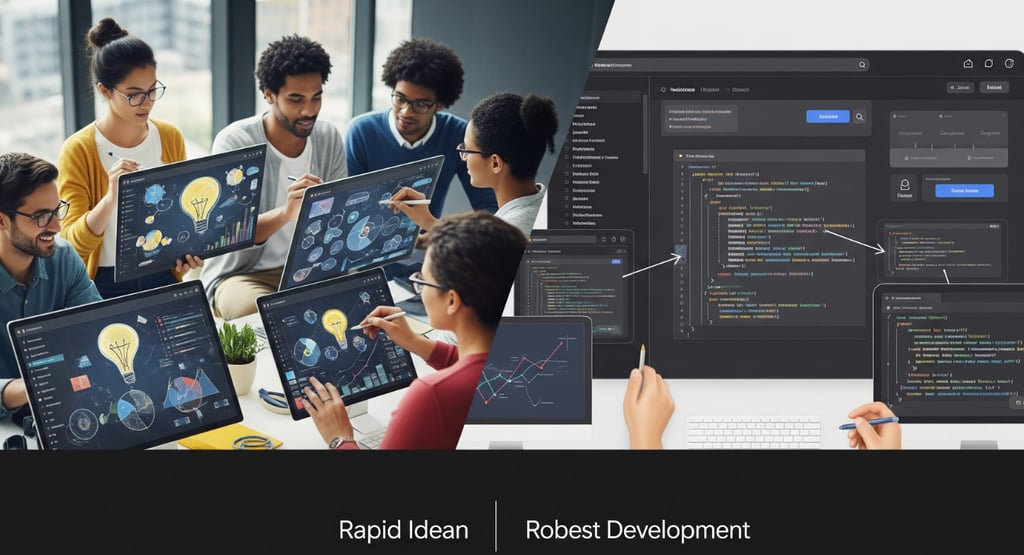Why AI-Powered No-Code Tools Represent the Future of SaaS Development
Explore how AI-powered no-code tools like Base44 and Lovable are transforming SaaS development. Learn to build apps faster, reduce costs, and empower non-technical founders, as this guide uncovers the future of software creation and its impact on startups and developers.
Eddy Enoma
7/18/20259 min read
Base44 and Lovable Are Rewriting the Rules of Software Development
The future of building SaaS products is no longer buried in code. Thanks to AI-powered platforms like Base44 and Lovable, anyone from solo founders to enterprise teams can describe the app they want and watch it come to life in minutes. No programming languages. No boilerplate setup. Just instant creation, powered by conversational prompts.
This is not merely an incremental improvement; it signifies a fundamental redefinition of how software is conceived and constructed. Whether the objective is to launch a disruptive startup, rigorously validate a Minimum Viable Product (MVP), or streamline operations with bespoke internal tools, the very methodology of software creation is being re-engineered.
From Code to Conversation: The Evolution of Software Creation
Historically, the progression from a conceptual software idea to a deployable product was often characterized by considerable obstacles. Traditional development processes demanded a unique confluence of resources and specialized skills:
Advanced Coding Expertise: Proficiency in diverse programming languages such as Python, JavaScript, Ruby on Rails, or Java was an absolute prerequisite.
Extended Engineering Timelines: Even the development of a rudimentary MVP typically necessitated weeks, if not months, of dedicated person-hours for coding, debugging, and quality assurance.
Intensive Cross-functional Collaboration: Designers, developers, product managers, and quality assurance specialists were required to work in concert to deliver even basic functionality. This often resulted in communication inefficiencies and prolonged project timelines.
The advent of no-code and low-code platforms has initiated the democratization of development by offering visual interfaces and drag-and-drop functionalities, which significantly reduce the need for manual coding. However, AI-powered tools are now advancing this democratization to an entirely new level.
Platforms like Base44 and Lovable introduce a revolutionary concept: “vibe coding,” or more accurately, intent-driven development. Envision a scenario where you articulate the desired features, workflows, and user experience for your application, and the system intelligently constructs a functional product. This capability extends beyond merely assembling pre-built components; it involves an AI interpreting user intent and generating the necessary frontend and backend logic. This innovative approach elevates no-code development to AI-assisted software engineering, making the creation of sophisticated applications accessible to a significantly broader audience.
Tool Spotlight: Base44 vs. Lovable (Navigating the AI-Powered Frontier)
The market for AI-powered development tools is experiencing rapid growth, with Base44 and Lovable serving as prime illustrations of their transformative potential. While both platforms empower users to build applications without traditional coding, they offer distinct advantages tailored to varying stages of the development lifecycle and team requirements.
Base44: Accelerating Rapid Prototyping and Concept Validation
Base44 is engineered for agility and immediate output. Its core strength lies in its natural language prompt-driven builder. This allows users to interact with the platform, akin to collaborating with a human developer, describing desired features and functionalities using conversational English.
Key attributes and advantages of Base44 include:
Expedited Concept Generation: It is ideally suited for rapid prototyping and quickly validating novel business ideas. Users can transition from an abstract concept to a tangible, interactive application within minutes, facilitating immediate feedback and iterative refinement.
Automated Front-end and Back-end Generation: Unlike some no-code tools that may require manual database setup or API integrations, Base44 aims for a truly comprehensive generation process, managing the complexities of both the user interface and the underlying logic.
Integrated Deployment: Upon application generation, Base44 often provides seamless, one-click deployment options, enabling swift deployment of the product to users. This feature is crucial for MVP development and efficient market testing.
Accessibility for Non-Technical Founders: Its intuitive, conversational interface makes it highly accessible for entrepreneurs and business strategists who possess innovative ideas but lack traditional coding proficiency. A clearly articulated vision is frequently sufficient to bring an application to fruition.
It is important to acknowledge that Base44, prioritizing speed and abstraction, may offer limited direct access to the underlying code. While this simplifies the initial build, it could present considerations for teams requiring deep customization or complex integrations not natively supported.
To learn more about Base44, explore Base44: No-Code App Development with AI ( No Coding Required)
Lovable: Enabling Long-Term Scalability and Collaborative Flexibility
Lovable adopts a slightly different methodology, emphasizing robustness, deeper integration capabilities, and collaborative workflows. This makes it particularly well-suited for teams focused on building scalable SaaS solutions beyond initial prototyping.
Key attributes and advantages of Lovable include:
Full-stack Builder with Extensive Backend Integration: Lovable provides more granular control over the backend infrastructure, facilitating complex data models, custom logic, and seamless integration with external APIs and services. This positions it as a powerful tool for constructing more sophisticated and enterprise-grade applications.
Code Exportability via GitHub: A significant differentiator, Lovable offers the capability to export the generated code. This addresses a primary concern associated with many no-code platforms: vendor lock-in. By providing access to the underlying codebase, teams retain full ownership and flexibility, enabling them to customize, extend, or even migrate their application if necessary. This feature is invaluable for long-term software development strategies.
Real-time Team Collaboration: Designed with team collaboration in mind, Lovable facilitates real-time development, allowing multiple stakeholders from product managers to developers to work concurrently on the same project. This streamlines communication and accelerates development cycles for larger organizations.
One-click Deployment with Custom Domains: Similar to Base44, Lovable offers straightforward deployment, augmented by the flexibility of custom domain integration, which is essential for branding and professional presentation.
Transparent Infrastructure for Developer Handoff: For organizations with existing development teams, Lovable provides transparent insights into the generated infrastructure, facilitating a smoother and more efficient transition or “handoff” from the no-code builder to traditional development teams. This bridges the gap between rapid prototyping and professional development.
For a closer look at Lovable, check out Lovable: The AI-Powered Platform That Builds Apps in Minutes
Collectively, Base44 and Lovable are not merely tools; they are fundamentally redefining the approach to SaaS creation. Base44 excels at accelerating idea validation and rapid concept testing, empowering founders to iterate quickly and cost-effectively. Lovable, conversely, provides teams with the flexibility, scalability, and collaborative features essential for building and maintaining robust, enduring SaaS products. This complementary relationship underscores the diverse applications of AI in software development.
Implications for Startups: A New Paradigm of Entrepreneurial Agility
For the lean and agile world of startups, AI-powered no-code tools represent a significant enabler. They dramatically reduce barriers to entry, democratizing entrepreneurship and allowing innovative ideas to gain traction with unprecedented speed.
Accelerated Market Entry: The ability to develop MVPs in days, rather than weeks or months, provides a substantial competitive advantage. Startups can rapidly validate their product-market fit, iterate based on genuine user feedback, and pivot swiftly if necessary. This accelerated time-to-market can be a decisive factor in acquiring early adopters and establishing a competitive position.
Optimized Resource Allocation: Traditional development often necessitates considerable upfront investment in developer salaries, infrastructure, and tools. AI-powered no-code platforms significantly reduce upfront costs without compromising capability. This allows startups to conserve valuable capital, extend their operational runway, and allocate resources to other critical areas such as marketing, sales, and customer acquisition. This cost-efficiency in SaaS development is transformative for bootstrapped ventures.
Enhanced Iteration and Adaptation: The reduced cost and accelerated development cycles inherent in these tools provide greater scope for experimentation and iteration. If an initial concept does not resonate with the market, it is no longer a catastrophic failure but a valuable learning opportunity. Startups can swiftly develop a revised version, test an alternative hypothesis, and refine their product with minimal financial or temporal penalties. This culture of rapid iteration is fundamental to startup success.
Empowerment of Non-Technical Founders: Perhaps one of the most profound impacts is the empowerment of non-technical founders. Historically, a compelling business idea without a technical co-founder often remained unrealized. Now, an entrepreneur’s vision, coupled with the ability to clearly articulate it to an AI, is sufficient to bring a functional product into existence. This fosters an era of maker-led software development, where the visionaries can also serve as the architects of the solution.
These tools effectively bridge the gap between ideation and implementation, fueling an unprecedented era of innovation and entrepreneurial dynamism.
Implications for Developers: Evolution, Not Obsolescence
The proliferation of AI-powered no-code tools may initially elicit apprehension among traditional developers. However, the reality is far from a scenario of redundancy. Instead, these tools herald an evolution in developer roles, liberating them from repetitive, labor-intensive tasks and enabling them to concentrate on higher-value activities. Technology teams are not diminishing; they are evolving.
Anticipate significant changes in the roles and responsibilities of developers:
From Code Crafting to AI Guidance: Developers will transition from meticulously writing every line of code to acting as “AI orchestrators.” Their expertise will reside in comprehending how best to prompt, configure, and refine AI systems to generate optimal code and functionality. This shift necessitates a deeper understanding of architecture, system design, and AI capabilities rather than solely syntax.
From Setup Debugging to Architectural Optimization: The burden of configuring complex development environments, managing dependencies, and troubleshooting common boilerplate errors will largely diminish. Instead, developers will focus on optimizing the architecture of AI-generated applications, ensuring scalability, performance, and security. They will function as strategic architects rather than primary builders.
From Siloed Execution to Collaborative Iteration: AI-powered platforms, particularly those like Lovable with robust collaborative features, will foster a more integrated development process. Developers will collaborate more closely with product managers, designers, and even business stakeholders, providing technical oversight and ensuring that AI-generated solutions align with business objectives and technical best practices. This cultivates a more collaborative development environment.
Focus on Complex Customizations and Integrations: While AI handles common functionalities, developers will specialize in constructing the truly unique, custom components and intricate integrations that differentiate a SaaS product. Their work will shift from generic CRUD (Create, Read, Update, Delete) operations to sophisticated algorithms, advanced data processing, and highly specialized API connections.
Guardians of Security and Compliance: As AI generates more code, the role of developers in ensuring the security, compliance, and robustness of these applications becomes paramount. They will be critical in auditing AI-generated code, implementing stringent security protocols, and navigating regulatory requirements, particularly for enterprise SaaS development.
This represents not the cessation of development as we understand it, but a new beginning. Developers gain enhanced focus, greater creative leverage, and the capacity to tackle more intellectually stimulating challenges, transcending routine tasks to genuinely innovate. The future of software engineering promises increased productivity and strategic impact for technical talent.
Critical Considerations: Addressing Key Questions for Responsible Adoption
While the promise of AI-powered no-code tools is immense, responsible adoption mandates a critical examination of potential challenges and long-term implications. As these tools mature, several crucial questions warrant our attention:
Can AI-generated applications scale reliably and efficiently? While current iterations excel for MVPs and simpler applications, their true test lies in their ability to manage millions of users, complex transactions, and extensive data loads. The underlying architecture generated by AI must demonstrate robustness, performance, and maintainability at scale. This is a critical factor for scalable SaaS solutions.
Ownership of Data and Infrastructure: The abstraction provided by these platforms can occasionally obscure the specifics of data storage, processing, and infrastructure management. Users must comprehend where their data resides, how it is protected, and who has access. Transparency regarding infrastructure ownership and data governance is paramount, especially for businesses handling sensitive customer information.
Potential for Vendor Lock-in: A significant concern with any platform-dependent solution is the potential for vendor lock-in. If an entire application is constructed within a proprietary AI no-code ecosystem, migrating away or integrating with external services might prove challenging or costly. This is why platforms like Lovable, which offer code exportability, are proactively addressing this concern. Users require clear exit strategies and assurances regarding data portability.
Continued Need for Human Engineers in Critical Systems: Even with highly advanced AI, there will likely remain a necessity for human engineers to manage highly specialized, mission-critical backend systems, complex algorithms, or custom integrations that fall outside the scope of general-purpose AI generation. The most intricate and unique business logic will probably continue to require bespoke human engineering. This suggests a hybrid future for software development teams.
Security Vulnerabilities in AI-Generated Code: While AI can generate code rapidly, the security implications of that code must be rigorously assessed. Is there a risk that AI could introduce subtle vulnerabilities that might be difficult to detect? Robust testing, auditing, and continuous security practices will be essential, with human developers playing a crucial role in validating the security posture of AI-generated applications.
Ethical Implications and Bias in AI Models: The AI models underpinning these no-code platforms are trained on vast datasets. It is crucial to understand if these models could inadvertently introduce biases into the applications they generate, leading to unfair or discriminatory outcomes. Transparency in model training and ongoing vigilance against bias will be necessary.
These concerns are valid and will undoubtedly shape the roadmap for the responsible and successful adoption of AI-powered no-code development. Platform providers will need to proactively address these issues to build trust and ensure long-term viability.
Concluding Thoughts: The Future is Conversational, Creative, and Universally Accessible
The advent of Base44 and Lovable offers a compelling vision of what is achievable when human ingenuity converges with advanced computational capabilities. They unequivocally demonstrate that SaaS development is no longer the exclusive domain of professional coders; it is rapidly becoming accessible to visionaries, innovators, and entrepreneurs from diverse backgrounds.
This heralds a future where the capacity to build and innovate is primarily limited by imagination, not technical proficiency or financial constraints. Whether you are an aspiring entrepreneur eager to validate a new business concept, an established enterprise seeking to develop bespoke tools for your team with unparalleled speed, or a creative individual striving to bring digital products to life with efficiency and style, the future of development is already unfolding.
And perhaps most significantly, it communicates in your language. The dialogue between human intent and machine creation has just commenced, promising an era of unprecedented innovation and digital empowerment for all. The future of SaaS development is fundamentally a collaborative synergy between human ingenuity and artificial intelligence, leading to a world where software creation is as intuitive as conversation.
Stay ahead of the curve in SaaS and AI. Subscribe to our newsletter for the latest insights, tool updates, and development trends.
Subscribe for Exclusive Tips & Updates. Enter Your Email Below!



Get the latest strategies on content creation, freelancing, and affiliate marketing, plus passive income straight to your inbox!
🔒 We respect your privacy. Your email is safe with us. Unsubscribe anytime.
Address
Sporerweg 16
94234 Viechtach, Germany
Contacts Us
(049) 170 499 6273
Subscribe to our newsletter
© 2026 Onlinebizoffers. All rights reserved.
Privacy Policy | Terms & Conditions | Returns & Refunds Policy | Affiliate Disclosure








